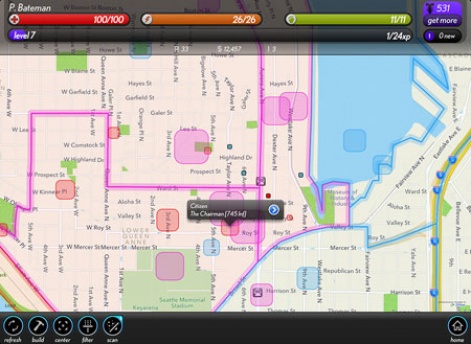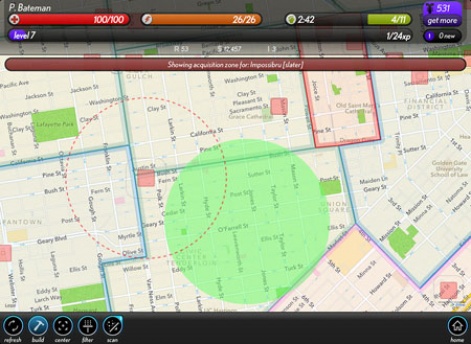But that doesn't mean there aren't some niche developers who are building their communities and expertise. One such as US-based MeanFreePath.
It launched its debut Turf Wars way back in January 2010, following up with new release Global Supremacy in June 2013.
A good opportunity then to talk to company founder Nick Baicoianu about what the developer learned along the way, and where it's going next.
Pocket Gamer: Can you provide some background about MeanFreePath, and why you're focused on location-based games?
Nick Baicoianu: We're a small shop comprised of a few contractors and myself.
I've always been fascinated by geography and games, and when Apple announced iOS 3 - with its embeddable map control - I knew I had to try my hand in the App Store.
I started MeanFreePath soon after and set about to create one of the first location-based games on iOS Turf Wars. A lot has changed in the past four years, and location-based services (LBS) has become a robust and fascinating niche.
What trends are you seeing in terms of how real-world information is being used, and the sorts of games players want to play?
There's definitely been a trend away from the Foursquare-like 'check-in model' in recent years.
Early on, nearly every LBS game was based on these predefined locations you could check into for bonuses, which worked fine for a while.

Downtown Seattle within Global Supremacy
Nowadays players are expecting a richer gameplay experience, and the challenge is to integrate the real world without losing sight of the fact your player may be in your game to escape for a while.
How has your experience of operating Turf Wars influenced Global Supremacy?
Our experience running Turf Wars was invaluable in the creation of Global Supremacy.
Having existing player feedback and a live dataset made it easier to plan new features and balance gameplay with less trial and error. This allowed us to more effectively focus our development on improving the new features in Global Supremacy.
How come you only support iOS? And considering this type of game requires a connection, wouldn't it make sense to run them using HTML5 or in-browser?
One of the interesting things about Turf Wars and Global Supremacy is they are primarily HTML5 games.
This gives us a much faster development cycle than could happen with a pure iOS app, and makes it way easier to port the game to other platforms when the need arises.
That said, our iOS-only stance will continue for the foreseeable future, based on what we've seen and what we've heard from other developers - none of the other platforms can offer the return on investment that iOS currently does.
For a small shop like us, that's a big selling point.
Do you think the sort of people who play LBS games are different to the average mobile gamer?
LBS games definitely attract a different breed of gamer - they are more dedicated and willing to invest time and resources into their character and their territory.
Their more competitive play style is encouraged by the fact that the control of real-world territory is at stake.
It's amazing to see some of the energy that goes into playing the game, though things can get pretty heated when there's a war on!
What sort of global distribution do you see for your games?
The vast majority of our players hail from the US and Commonwealth countries - UK, Canada, Australia, etc, but there are pockets of sometimes intense activity in Europe, Asia, and the Middle East.

Ground zero for many LBS - San Francisco
You'll sometimes get a group of friends or neighbors who dive right in and turn their town into a hotbed of activity, attracting players from other regions, leading to some pretty intense action in far-flung places around the world.
How do you deal with lack of player density in terms of making the game interesting if people aren't playing in a major city?
Lower density areas can be a challenge, since they tend to offer less interaction with other players, but on the flipside offer players more room to expand before worrying about getting clobbered.
So it's important to offer a good single-player gameplay - for example, creating well-defined goals - for all players while they get started.
This will only keep players occupied for so long, so we typically add some sort of virtual travel to allow everyone to interact with the larger game ecosystem if they choose to.
Are there any figures you can break out in terms of retention and monetisation?
Retention is higher than typical role-playing or strategy games across the board, compared to the benchmarks we've seen; some of our Turf Wars players have been playing for nearly four years
Per-player revenue figures mimic this trend, and our dailies are typically two to three times the industry average.
What's next for Global Supremacy and LBS gaming?
One of the great things about launching a new app is the wide range of directions you can take it.
We have some great features coming before the holidays to improve intercontinental travel, and really emphasize the territorial combat aspect of the game.
Location-based gaming is an exciting niche to occupy, and as the App Store continues its growth there's always more room to find and expand our audience.
Thanks to Nick for his time.
You can find out more details about Global Supremacy here.





















